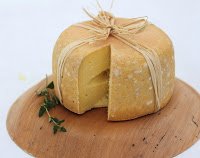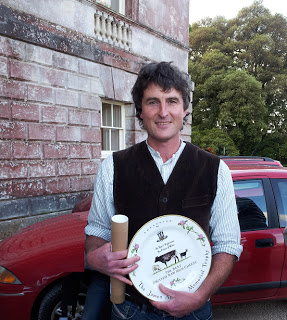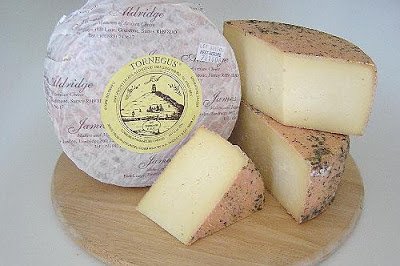If you love British
cheese, then you should read up on a chap called James Aldridge who
died in 2001. He was a key figure in the resurrection
of farmhouse cheesemaking in Britain in the 1980s and 90s, and his influence can still be felt today.
A former mechanic and scaffolder, Aldridge was a skilful maturer of cheeses (or affineur, if you prefer the French term), taking other people's cheeses and making them all his own by ageing and washing them in the cheese equivalent of alchemy.
A former mechanic and scaffolder, Aldridge was a skilful maturer of cheeses (or affineur, if you prefer the French term), taking other people's cheeses and making them all his own by ageing and washing them in the cheese equivalent of alchemy.
His most famous
creation was Tornegus (pictured above), which was made by washing
Caerphilly in wine, but he also developed an amazing number of other
cheeses that are still regarded as British classics today. Working at
his dairy, the Eastside Cheese Company in Surrey,
with his partner Pat Robinson, he invented cheeses such as Lord of
the Hundreds, Flower Marie and Celtic Promise, among many others,
sharing his recipes with fellow cheesemakers, who continue to make
them today.
 The end of his life was
marred by an e-coli poisoning health scare, which brought him to the
brink of financial ruin after officials ordered him to destroy
£50,000-worth of perfectly good cheese without any compensation. The
then public health minister, Tessa Jowell, acted in a pretty shameful
way during the incident. There's more about it and Aldridge's life in
these excellent articles in The Telegraph and by cheesemonger Carl Bennett.
The end of his life was
marred by an e-coli poisoning health scare, which brought him to the
brink of financial ruin after officials ordered him to destroy
£50,000-worth of perfectly good cheese without any compensation. The
then public health minister, Tessa Jowell, acted in a pretty shameful
way during the incident. There's more about it and Aldridge's life in
these excellent articles in The Telegraph and by cheesemonger Carl Bennett.
Even though it's eleven
years since he died, Aldridge's influence can still be seen in new
cheeses being launched today, such as Francis (left), which has just won
best new cheese at the British Cheese Awards. Made by James McCall of
James' Cheese, who worked with Aldridge for 17 years, the washed rind cow's milk cheese is named after his former mentor (Aldridge's Christian name was
actually Francis), while Martin Gott at Holker Farm in Cumbria also
paid homage to Aldridge (who he met while a young boy) by calling his
washed rind ewe's milk cheese St James.
 |
| Charlie Westhead of Neal's Yard Creamery with his James Aldridge Memorial Trophy |
The Specialist
Cheesemakers' Association also organises an award called the James
Aldridge Memorial Trophy to recognise the best raw milk cheese each
year. Last year's winner was Berwick Edge and this year the accolade went to the
ever excellent goat's cheese Ragstone, made by Charlie Westhead
(pictured right with his SCA trophy) and Haydn Roberts at Neal's Yard Creamery.
Westhead was lucky
enough to meet Aldridge on several occasions. “He was a great guy.
He was extremely blunt and didn't put up with any rubbish. If he
thought something was shit, he would tell you,” he recalls. “But
he had a huge love of cheese and cheesemaking and was one of the
first people to really get into the science side of things rather
than doing things by feel. He would visit dairies free of charge and
was happy to pass on advice.”
* I never met James Aldridge, so I would love to hear from cheesemakers and mongers who knew him and how he influenced the cheeses they makes and sell. Leave a comment below or drop me a line at patrick.mcguigan (at) yahoo.co.uk


Patrick,
ReplyDeleteAnother good article: James was truly one of the godfathers of the British Cheese Revival. Isle of Mull Cheddar posted his old website and notes through their website: https://www.isleofmullcheese.co.uk/jalldridge/jaindex.htm
It is definitely worth a look and read to anyone interested in cheese.
Andy Swinscoe